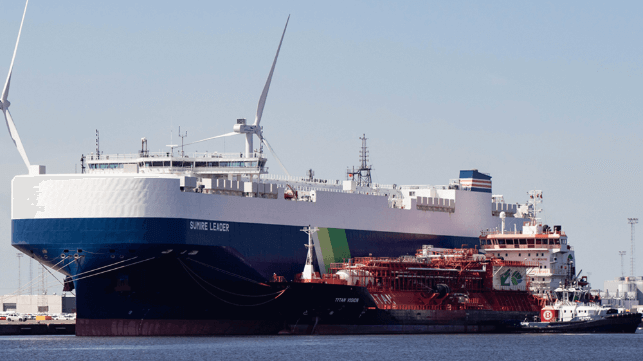NYK Joins the Push for Bio-LNG in European Shipping

Japanese line NYK has begun using bio-LNG-credited fuel to regularly bunker its car carriers at Zeebrugge, reducing net greenhouse gas emissions for select vessels. So far, two NYK ships have received bio-LNG-credited fuel from diversified LNG supplier Titan Supply.
The physical fuel delivery is blended with conventional LNG, but is credited to the vessel as a biofuel by booking the attributes of other bio-LNG produced and used elsewhere. It is an ideal fuel for LNG vessel operators, as it requires no further technical modifications or training to begin using aboard a dual-fuel LNG ship. In addition to its environmental benefits, bio-LNG offers a way to comply with the EU Emissions Trading System (ETS), which treats biofuel as a zero-emissions fuel source.
NYK's biofuel purchases are ISCC EU certified as sustainable, traceable and carbon neutral. They contain methane that would otherwise be released to the atmosphere if not captured and burned, the carrier said. The same supplier is also used by NYK's joint-venture carrier UECC, which purchases mass-balanced bio-LNG from Titan for 95 percent of the bunkering of its dual-fuel LNG car carriers. (CMA CGM is also a prominent user of bio-LNG in Europe, but has its own supplier arrangements with a French utility.)

that matters most
Get the latest maritime news delivered to your inbox daily.
Bio-LNG is primarily methane, a far more potent greenhouse gas than CO2; the fuel's emissions profile increases quickly as the amount of the fuel that escapes into the atmosphere goes up. Leaks during production, distribution and use could "erase the sustainability benefits" of a bio-LNG value chain, the Maersk McKinney-Moller Center for Zero Carbon Shipping warned in an assessment last year. Securing an emissions improvement from bio-LNG requires "practicing excellence" in leak prevention during production and transport - a tough goal to achieve, the center warned.
"We consider tightening of the regulations in the biogas industry as being of the utmost importance and urgency to ensure that new plants coming into operation have incorporated the right technology to be emissions-free," the Maersk Center concluded.
